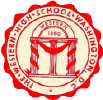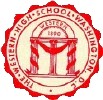WESTERN HIGH SCHOOL ALUMNI ASSOCIATION
Geoffrey Chew, ’40
Theoretical physicist; Professor and Department Chair, Lawrence Berkeley Lab, University of California
Geoffrey Foucar Chew (June 5, 1924 — April 11, 2019) was an American physicist. Born and raised in Washington, DC, Chew graduated from high school at the age of 16. In 1944, he received a B.S. in Physics from George Washington University. One of his professors, George Gamow, recommended that Chew join Edward Teller’s team on the Manhattan Project at Los Alamos.
After arriving at Los Alamos, Chew worked on various calculations related to Teller’s ideas for developing the hydrogen bomb. Chew witnessed the Trinity Test from a nearby mountain.
In 1946, Chew began his Ph.D. under Teller at the University of Chicago, but soon switched to become a student of Enrico Fermi. He received his doctorate in theoretical particle physics in 1948. Chew served as a postdoc and assistant professor of physics at the University of California, Berkeley between 1948 and 1950, but resigned after refusing to sign the university’s controversial loyalty oath. After seven years teaching at the University of Illinois, Chew returned to Berkeley in 1957.
Chew is best known for articulating the idea of “nuclear democracy,” which rejected the traditional division between elementary and composite particles, and the “bootstrap theory,” based on reinterpretations of Feynman diagrams. In 1962, Chew was awarded the Hughes Prize of the American Physical Society for this theory. In 1969, he received the Ernest Orlando Lawrence Award from the U.S. Atomic Energy Commission.
Chew was a professor emeritus at the University of California, Berkeley Center for Theoretical Physics. He was a member of the National Academy of Sciences and the American Academy of Arts and Sciences.
Citation: “Geoffrey F. Chew,” Atomic Heritage Foundation. Retreived July 8, 2024 from https://ahf.nuclearmuseum.org/ahf/profile/geoffrey-f-chew/



